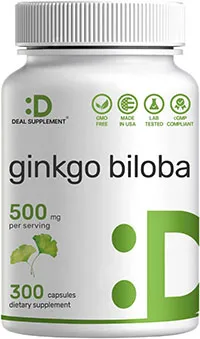Introduction to Ginkgo Biloba
Ginkgo Biloba, a time-honored herbal remedy, has garnered attention for its potential benefits in managing Attention Deficit Hyperactivity Disorder (ADHD). This article delves into the intriguing relationship between Ginkgo Biloba and ADHD, shedding light on its benefits, mechanism of action, and optimal dosage.
Understanding Ginkgo Biloba
Ginkgo Biloba, derived from the leaves of the Ginkgo tree, boasts a rich history of medicinal use dating back centuries. Revered for its cognitive-enhancing properties and vascular benefits, Ginkgo Biloba has emerged as a popular natural supplement for promoting brain health and overall well-being.
Benefits of Ginkgo Biloba in ADHD Management
- Improved Focus and Attention: Ginkgo Biloba may enhance focus, attention, and concentration in individuals with ADHD.
- Enhanced Executive Function: Studies suggest that Ginkgo Biloba may improve executive function, including planning, organization, and impulse control.
- Reduced Hyperactivity: Some research indicates that Ginkgo Biloba may help reduce hyperactivity and impulsivity symptoms associated with Attention Deficit Hyperactivity Disorder.
- Neuroprotective Effects: Ginkgo Biloba exhibits neuroprotective properties, shielding the brain from oxidative stress and inflammation, potentially benefiting individuals with ADHD.
Mechanism of Ginkgo Biloba in ADHD
Ginkgo exerts its effects on ADHD through several mechanisms:
- Improved Cerebral Blood Flow: Ginkgo Biloba enhances cerebral blood flow, promoting oxygen and nutrient delivery to the brain, which may improve cognitive function.
- Neurotransmitter Modulation: Ginkgo Biloba influences neurotransmitter activity, particularly dopamine and norepinephrine, which play crucial roles in attention, focus, and impulse control.
- Antioxidant and Anti-inflammatory Activity: Ginkgo’s antioxidant and anti-inflammatory properties protect neurons from oxidative damage and inflammation, potentially mitigating ADHD symptoms.
Optimal Dosage Guidelines
Determining the appropriate dosage of Ginkgo for ADHD management requires careful consideration:
- Standardized Extract: Opt for a standardized Ginkgo Biloba extract containing 24-32% flavonoids and 6-12% terpenoids for consistency and efficacy.
- Dosage Range: Typical dosages for adults range from 120mg to 240mg per day, divided into two or three doses.
- Gradual Titration: Start with a lower dosage and gradually increase to assess tolerance and efficacy.
- Consultation with Healthcare Provider: It’s essential to consult with a healthcare provider before starting Ginkgo Biloba supplementation, especially if you’re taking medication or have underlying health conditions.
Safety Considerations
While Ginkgo Biloba is generally safe for most individuals, certain precautions should be observed:
- Potential Interactions: Ginkgo Biloba may interact with certain medications, including blood thinners, antidepressants, and anticonvulsants, so consult with a healthcare provider if you’re taking any prescription drugs.
- Allergic Reactions: Individuals with allergies to Ginkgo Biloba or related plants should avoid supplementation.
- Side Effects: Rare side effects of Ginkgo Biloba may include headache, digestive upset, and allergic reactions, although these are uncommon.
The Future of Ginkgo Biloba in ADHD Management
As research into Ginkgo and ADHD continues to evolve, ongoing studies aim to elucidate its efficacy and safety profile further. With its potential to improve cognitive function, attention, and impulse control, Ginkgo Biloba holds promise as a complementary approach to managing ADHD symptoms.
Conclusion
In conclusion, Ginkgo Biloba represents a natural remedy with potential benefits in managing ADHD symptoms. By enhancing focus, attention, and executive function while mitigating hyperactivity and impulsivity, Ginkgo Biloba offers a holistic approach to supporting individuals with ADHD. As our understanding of its mechanism and efficacy deepens, Ginkgo may emerge as a valuable adjunctive therapy in the comprehensive treatment of ADHD.
Source: https://www.ncbi.nlm.nih.gov/pmc/articles/PMC5855296/


